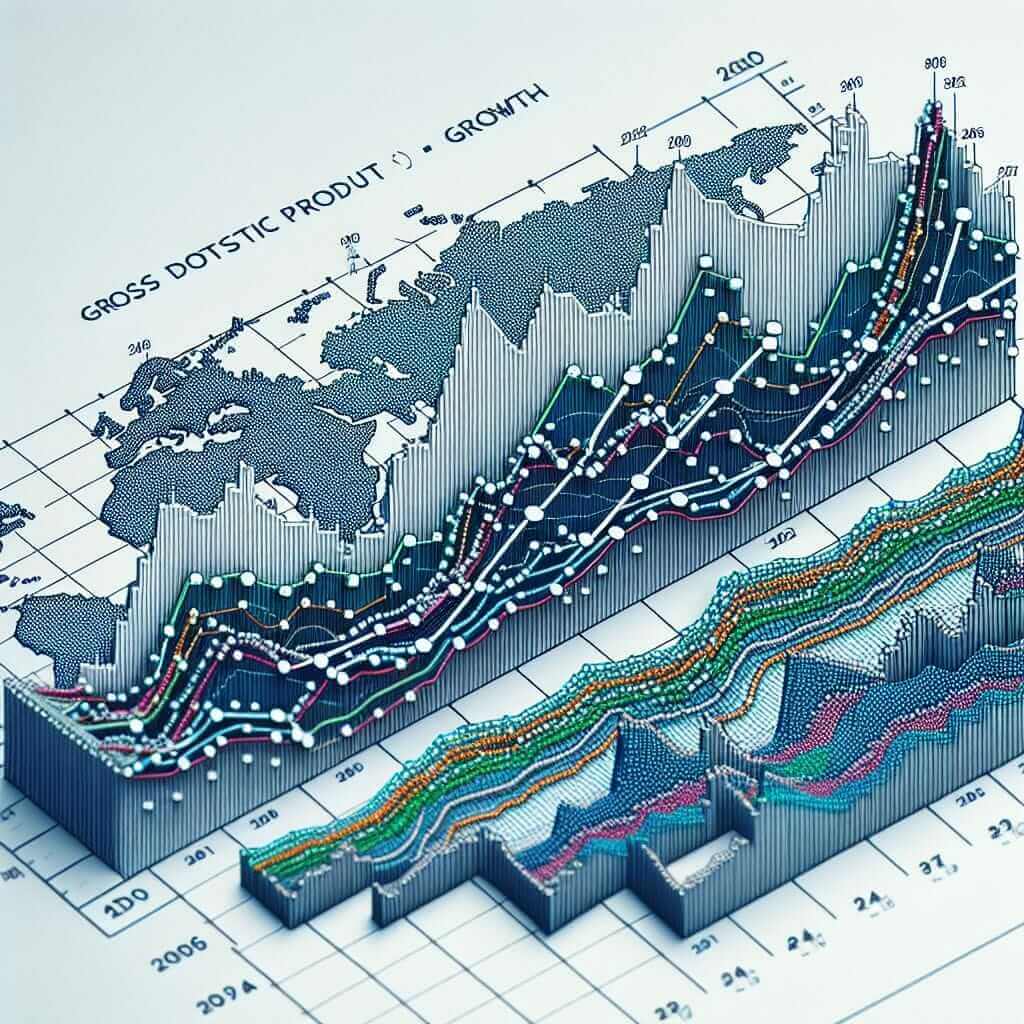The IELTS Writing Task 1 often features charts, graphs, or tables that depict trends and patterns in data. One common theme is economic indicators, such as GDP growth rates. This article provides a step-by-step guide on how to effectively analyze and write about “GDP Growth Rates in Emerging Markets (2000-2023)” for IELTS Writing Task 1, aiming for a Band 7+ score.
To illustrate the process, we’ll consider some potential exam questions:
- The line graph shows the GDP growth rates of three different emerging markets between 2000 and 2023. Summarize the information by selecting and reporting the main features, and make comparisons where relevant.
- The table illustrates the GDP growth rates of five emerging economies in 2000, 2010, and 2020. Write a report for a university lecturer describing the information shown.
- The bar chart compares the average annual GDP growth rates of selected emerging markets in two periods: 2000-2010 and 2011-2020. Summarize the information by selecting and reporting the main features, and make comparisons where relevant.
Sample Task and Model Answer
Let’s choose the first question and develop a model answer. For this example, let’s assume the line graph depicts the GDP growth rates of Brazil, India, and China.

Analysis of the Task
The task requires you to:
- Identify the main features: Highlight the most significant trends, patterns, and changes in the GDP growth rates of the three countries.
- Make comparisons: Analyze the similarities and differences in the growth trajectories of Brazil, India, and China over the given period.
- Summarize the information: Present a concise and accurate overview of the data, avoiding unnecessary details.
Model Answer
The line graph illustrates the fluctuations in GDP growth rates for three major emerging economies – Brazil, India, and China – between 2000 and 2023.
Overall, China experienced the most dramatic growth in this period. At the start of the millennium, China’s GDP growth rate was around 8%, similar to India’s and slightly higher than Brazil’s. However, China’s growth surged significantly in the following years, peaking at approximately 14% in the mid-2000s. While this rapid growth gradually declined to about 6% by 2023, it remained significantly higher than the other two nations.
India also showed a steady upward trend in GDP growth, reaching about 9% by 2010. However, after a period of fluctuation, its growth rate stabilized at around 7% in the latter part of the period. Conversely, Brazil experienced more volatility. While displaying a growth pattern comparable to India’s in the first decade, it faced a significant downturn around 2015, with growth plummeting to nearly -4%. Although Brazil’s economy recovered in subsequent years, it failed to regain the consistent upward trajectory of India or China.
Word count: 190 words
Key Points to Remember
- Paraphrase the question: Never copy directly from the question. Rephrase the key information in your own words.
- Overview: Begin with an overview summarizing the main trends.
- Structure: Organize your writing logically, using paragraphs to separate different trends or time periods.
- Data Selection: Focus on the most significant data points. Don’t try to describe every single fluctuation.
- Comparisons: Highlight key similarities and differences. Use comparative language effectively (e.g., higher than, lower than, similar to).
- Tenses: Use appropriate tenses to describe past, present, and future trends.
- Vocabulary: Use a range of vocabulary related to trends (e.g., increase, decrease, fluctuate, peak, plateau).
- Grammar and Accuracy: Pay close attention to grammar, spelling, and punctuation.
Difficult Vocabulary
- Emerging Markets (adj.): /ɪˈmɜːrdʒɪŋ ˈmɑːrkɪts/ – Countries experiencing rapid economic growth and industrialization, moving from developing to developed economies.
- GDP (Gross Domestic Product) (n.): /ˌɡroʊs dəˈmɛstɪk ˈprɑːdʌkt/ – The total value of goods and services produced in a country during a specific period.
- Growth Rate (n.): /ɡroʊθ reɪt/ – The percentage increase in GDP or another economic indicator over a specific period.
- Fluctuation (n.): /ˌflʌktʃuˈeɪʃən/ – Irregular rising and falling in number or amount; variation.
- Surge (v.): /sɜːrdʒ/ – To increase suddenly and powerfully.
- Trajectory (n.): /trəˈdʒɛktəri/ – The path followed by something (like growth or development) over time.
- Volatility (n.): /ˌvɑːləˈtɪləti/ – The liability to change rapidly and unpredictably, especially for the worse.
- Downturn (n.): /ˈdaʊntɜːrn/ – A decline in economic activity.
- Plummet (v.): /ˈplʌmɪt/ – To fall or drop straight down at high speed.
- Stabilize (v.): /ˈsteɪbəˌlaɪz/ – To become stable or make something stable.
Conclusion
Mastering the IELTS Writing Task 1 requires a combination of analytical and language skills. By following these steps, practicing regularly, and familiarizing yourself with economic vocabulary, you can confidently approach tasks related to “GDP Growth Rates in Emerging Markets” and achieve your desired band score. Remember, clarity, accuracy, and effective data presentation are key to success.